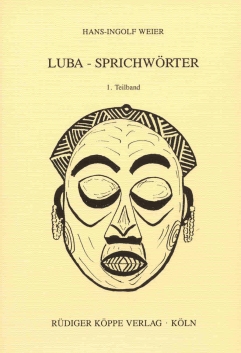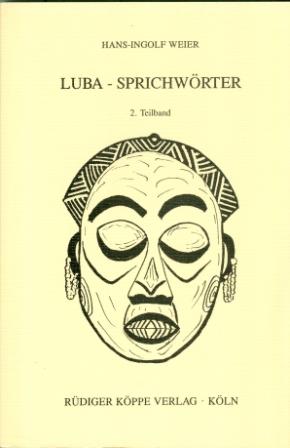



The present collection contains more than 2.070 proverbs in (Ci-)Luba of the Baluba and Beena Luluwa. The (Ci-)Luba (L. 30) language belongs to the Bantu languages (Niger-Congo) and is spoken by about 4,5 million people in the Democratic Republic of the Congo (formerly Zaïre), and more precisely in both Kasay provinces. This language is spoken by both groups and constitutes one of the four “official languages (linguae francae)” of the Republic of the Congo. It is also used as an educational medium in schools.
The basis of this work was a collection of an unknown missionary, which was acquired first by Leo Stappers. After his death the proverb collection was edited with informants’ help in Mainz before it was reviewed in the Republic of the Congo during field studies. In both design steps additional variations and information were accommodated. Looking at the presentation type chosen by the collector the reader can perceive his intention, because the relation proverb—catechism is unapologeticly recognizeable. This feature is retained in the reviewed edition and thus makes the collection interesting for comparative religion sciences, too.
The present work contains a complete translation, standardization and review of the collection, done by the help of one speaker per main dialect. Finally, the individual proverbs comprise the (Ci-)Luba proverb, a translation, a deviant interpreting french assignment, a (Ci-)Luba explanation, significance representation, and a reference to the (Ci-)Luba catechism, which is written in (Ci-)Luba, but without tonal delineation. If available, the reader finds enclosed an equivalence in German, a (Ci-)Luba comparison, as well as pictures to demonstrate the assigned reference.
To support comparative research two different indices were established: the (Ci-)Luba-Index contains proper nouns as well as plants, and animals, which can be often found in the proverbs as operating characters in the widest sense. The comprehensive German proverb index finally enables the reader to make internal (e.g. content) and external comparisons to other collections.
In separate volume the author analyses the tonal structures on which the Luba proverbs are based, see the link below:
[...] le recueil de Weier est à notre connaissance le plus complet à ce jour, en même temps que celui ou l'on observe enfin un effort de rendre les textes lisibles grâce à la notation de la tonalité et de la quantité. [...] Il faut ajouter à cette qualité de la transcription que la quasi totalité des proverbes s'accompagne d'une interprétation en lubà, ce qui rend ce travail très utile même pour le locuteur lubà qui ne connaît pas l'allemand. Voilà un recueil dont il faudra désormais toujours tenir compte chaque fois que l'on parlera de la littérature orale lubà.
Ngo Semzara Kabuta in Anthropos, 91/1996, 313f
© 2026 by Rüdiger Köppe Verlag – www.koeppe.de